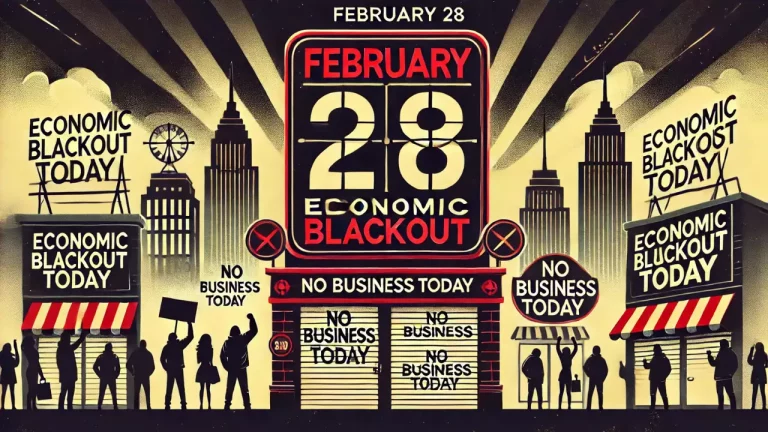
For generations, Black communities have driven the U.S. economy with their purchasing power, yet far too often, that power has been taken for granted. On Friday, February 28, 2025, Black consumers and allies will take a stand by participating in National Blackout Day, a nationwide economic protest against corporations that have abandoned their commitments to diversity, equity, and inclusion (DEI).
This isn’t just about boycotting—it’s about sending a clear message: the Black dollar is not to be ignored.
Why the Blackout?
National Blackout Day is a response to major corporations—including Amazon, Walmart, Target, and McDonald’s—that once pledged to uphold DEI initiatives but have since reversed course. Many of these companies, which made public commitments following the 2020 murder of George Floyd, have since disregarded or dismantled their DEI programs, aligning with political pressures to do so.
Black communities and their allies refuse to accept this betrayal in silence. By refusing to spend money at these corporations for at least one day—or more in some cases—protestors will demonstrate the economic power of Black consumers and remind businesses that their bottom lines depend on the very communities they have chosen to dismiss.
Who’s Leading the Call?
National leaders, including Rev. Al Sharpton, founder of the National Action Network, are spearheading the movement. Participants are encouraged to support only Black-owned and small businesses during the blackout.
Sharpton’s directive is clear:
“No Amazon. No Walmart. No Best Buy. No McDonald’s and other fast-food chains. No gas. No major retailers. Do not use credit or debit cards for non-essential spending. If you must spend, only support small local businesses.”
Dr. Otis Moss III, pastor of Trinity United Church of Christ in Chicago, emphasized the urgency of the protest, stressing that Black consumers must make their voices heard where it matters most—at the cash register.
“This is a nationwide blackout to demonstrate the economic power of our community and show that we will not be taken for granted,” Moss said.
More Than One Day
For some, the blackout will extend beyond February 28. Moss is calling for an additional day of economic protest on February 27, urging supporters to fill up their gas tanks and stock up on essentials before the boycott begins.
But the call to action doesn’t stop at spending. Moss has also urged participants to boycott social media on February 28, aiming to disrupt the algorithms that dictate online engagement.
“I know that’s going to feel like withdrawal for some, but Silicon Valley—the Jeff Bezoses, the Mark Zuckerbergs, the Peter Thiels—are financing much of what we see happening across this nation,” Moss said.
Instead of scrolling, Moss encourages people to pick up the phone and call one another, shifting the movement offline and into real-world conversations.
The Power of the Black Dollar
Economic boycotts are already making an impact. Retail giants like Target and Walmart have reported significant drops in sales, and shareholders are pressuring company boards for answers. These corporations are learning, in real time, that disregarding the very people who keep them in business comes with consequences.
Black consumers and their allies recognize that real change comes not only through voting but through economic leverage. The lessons of the Montgomery Bus Boycott remain relevant today: when communities stand together and withhold financial support from businesses that do not support them, the effects are undeniable.
A Movement, Not a Moment
While February 28 will mark a powerful day of action, it is only the beginning. National Blackout Day is part of a larger movement—one that demands respect, accountability, and long-term change from corporations that profit from Black consumers while failing to reinvest in their communities.
Will you stand in solidarity? Will you flex your economic power?
February 28, 2025—Blackout Day. The choice is ours.





